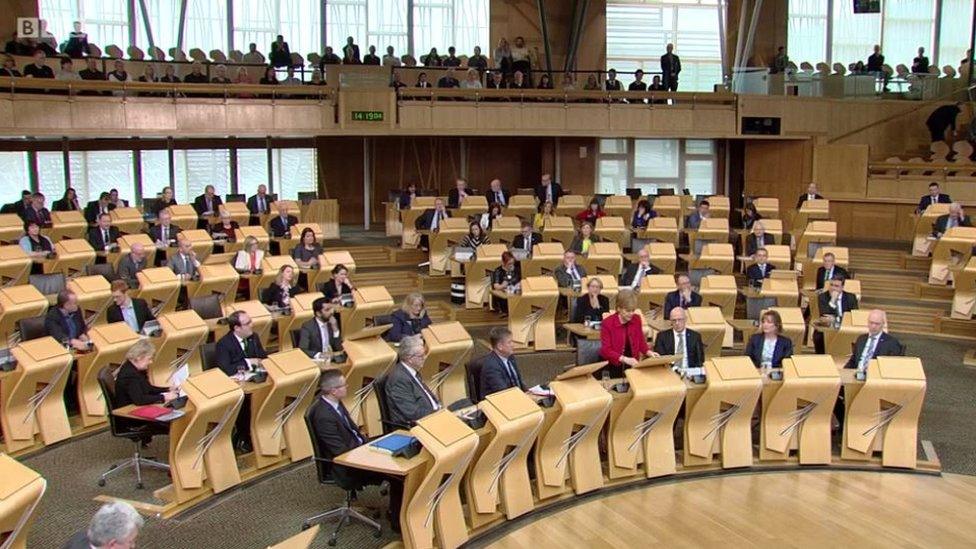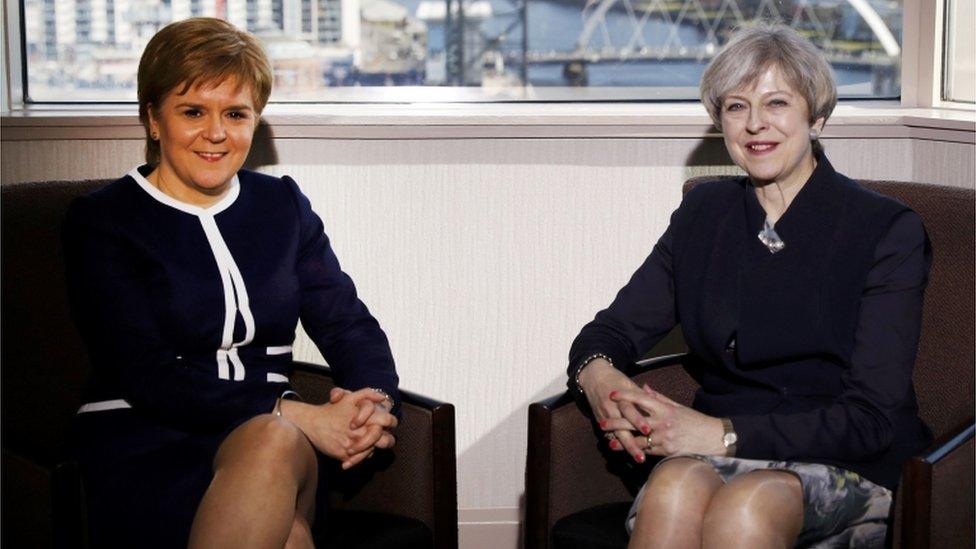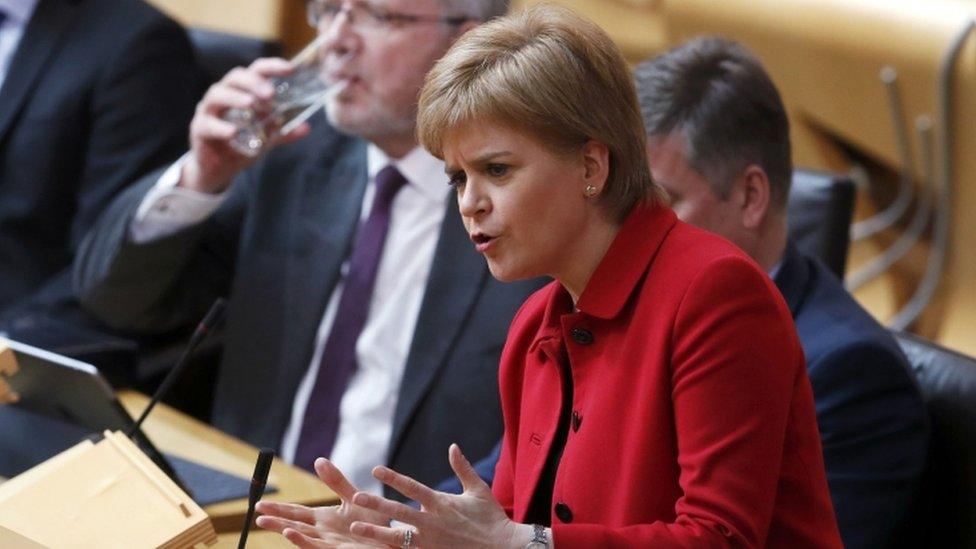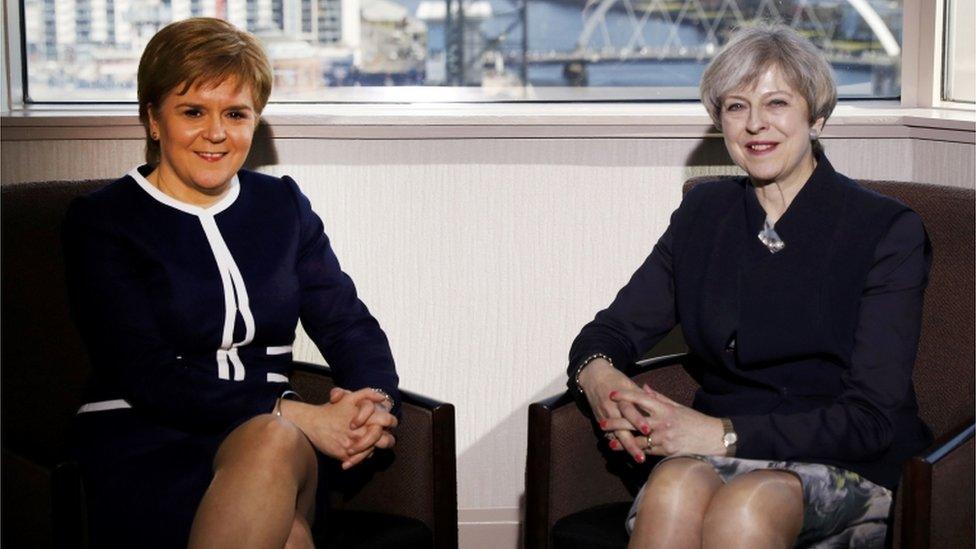Indyref2 debate kicks off a week of beginnings
- Published

Nicola Sturgeon reopened the Holyrood debate, which was halted after the terror attack at Westminster
Perhaps it was the gravity of the topic. Perhaps it was the reflection that this resumed debate had been postponed last week because of the terror attack on Westminster.
Either way, the debate on an independence referendum at Holyrood was marked, mostly, by a respectful, modest tone.
On Nicola Sturgeon's part, that was a deliberate choice. Ms Sturgeon can mix it with the best. On this occasion, she urged Parliament to pursue its business with "openness, respect, honesty and understanding".
She went further, quoting the Church of Scotland on the topic of decent discourse. The Kirk, she said, had called for debate which "informs and inspires". Not the contrary.
In making this pitch, Ms Sturgeon was also borrowing material from a recent party conference address. But since it was her own speech, she can be forgiven.
Mind you, there was a touch of steel here too. The first minister's speech featured an oblique warning to the prime minister. Oblique in that the details remain undisclosed.
'All the best'
Nicola Sturgeon met Theresa May in a Glasgow hotel yesterday, the Crowne Plaza colloquy. She noted today that she had wished the PM all the very best in pursuing a Brexit deal.
Then the sting. If the PM worked with the wishes of the Scottish government (and, after tonight's vote, parliament), then there would be co-operation. If not, then she would return after the Easter recess with an alternative approach.
Broadly, what might be involved? A party campaign can be presumed. Motions and debates in Holyrood and Westminster can be taken as read.
And more? Ministers reckon that the UK government may need Holyrood consent and support at sundry points during the Brexit process. Presumably, said support will be absent or grudging if UK ministers continue with their refusal even to countenance an independence referendum.

Nicola Sturgeon and Theresa May met at a hotel in Glasgow
You might call it a work to rule. But would it be effective? Depends upon the position of the voters. Scottish ministers believe that their collective endeavour will win public support - and hence UK acquiescence. UK ministers believe their approach - stick to the Brexit talks, put indyref2 on hold - will win public support and hence defray the SG endeavour.
Back to the debate. It was not all honey and ambrosia. As noted, there was an edge to the FM's remarks.
And several opposition MSPs, most notably Labour's Johann Lamont, castigated the SNP's "obsession", as they saw it, with independence. Many claimed that the "day job" - education, the NHS, the economy - was being neglected.
Ruth Davidson, leading for the Tories, was perhaps the most openly acerbic. She said that the Scottish people would find the SG recipe unpalatable. "It stinks", she said bluntly.
There were expressions of horror in the chamber, some of them genuine, when Ms Davidson declined to accept a repeat intervention from the FM, advising her to "sit down." Perhaps aware this was a little blunt, Ms Davidson then explained she had already permitted Ms Sturgeon to intervene - and had heard quite enough.
But then Ms Davidson also argued that blunt comment was by no means confined to her party. She recalled that the Tory benches had been harangued by a Scottish minister when the session was suspended last week.
A week of beginnings
For her part, Labour's Kezia Dugdale mirrored the FM in calling for "civility and decency", chiding the Conservative leader in the by-going. Ms Dugdale's approach was pained and passionate. A referendum was wrong, she argued, adding: "We are divided enough".
Andy Wightman of the Greens noted that there was a section of the Scottish public which viewed the prospect of indyref2 with dismay. But he argued that Brexit without Scottish consent, particularly hard Brexit, changed the terms and merited support for a further independence referendum.
Alex Cole-Hamilton of the Liberal Democrats opened with a confession. His attempt at an ad lib - ok, rehearsed - speech last week had been less than successful. He had dried, as the news of the Westminster terror attack filtered through.
Resorting studiously to notes on this occasion, he delivered an encomium for two Unions, that of the EU and that of the UK. He would fight to reverse Brexit. But, he argued, one did not fix Brexit by breaking the UK.
This is a week of beginnings. The start of Britain's extended departure from the UK on Wednesday. The publication on Thursday of a White Paper presaging the Bill which will repatriate legal powers to the UK, and thence to the devolved administrations. Of which, more later.
And the start today at Holyrood of a campaign to persuade and press the prime minister to concede a referendum upon Scottish independence.
- Published28 March 2017

- Published27 March 2017
